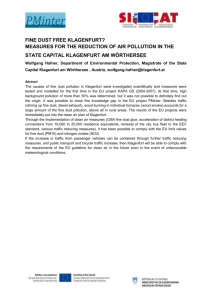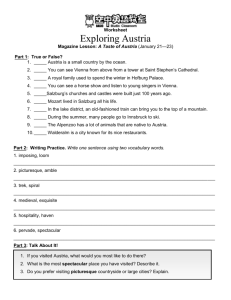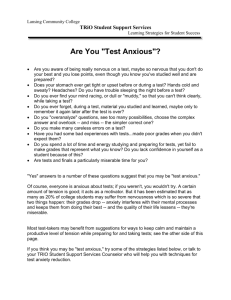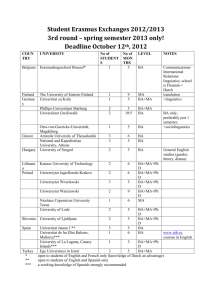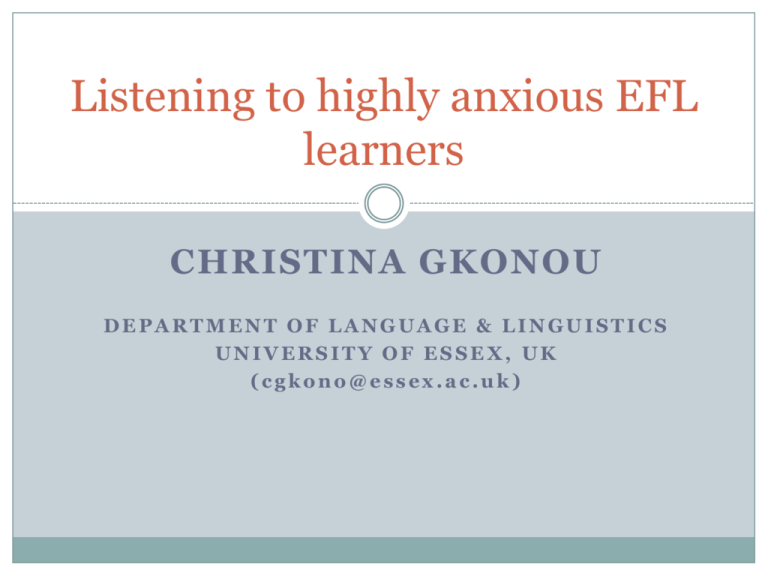
Listening to highly anxious EFL
learners
CHRISTINA GKONOU
DEPARTMENT OF LANGUAGE & LINGUISTICS
UNIVERSITY OF ESSEX, UK
(cgkono@essex.ac.uk)
Presentation outline
2
Theoretical background
Rationale for the present study
Methodological design
Findings and discussion
Pedagogical implications
Situating strategy use, Alpen-Adria Universitat, Klagenfurt, Austria, 16-17 October 2015
Affect
3
emotions;
beliefs;
attitudes;
motivation.
L2 learning can be stressful and face-threatening
(Arnold, 1999; Horwitz et al., 1986; Stevick, 1989).
Situating strategy use, Alpen-Adria Universitat, Klagenfurt, Austria, 16-17 October 2015
Language anxiety
4
“a distinct complex of self-perceptions, beliefs,
feelings, and behaviours related to classroom
language learning arising from the uniqueness of the
language learning process” (Horwitz et al., 1986, p.
128).
Communication apprehension, fear of negative
evaluation, test anxiety.
Situating strategy use, Alpen-Adria Universitat, Klagenfurt, Austria, 16-17 October 2015
Language anxiety (cont.)
5
Situation-specific.
Largely debilitating: “language anxiety interferes
with acquisition, retention, and production of the
TL” (Gregersen & MacIntyre, 2014, p. 4).
Situating strategy use, Alpen-Adria Universitat, Klagenfurt, Austria, 16-17 October 2015
Affective strategies (Oxford, 1990)
6
Lowering your anxiety (progressive relaxation, deep
breathing, meditation, music, laughter).
Encouraging yourself (making positive statements,
risk-taking, rewarding yourself).
Taking your emotional temperature (listening to
your body, checklist, language learning diary,
discussing feelings with someone else).
Situating strategy use, Alpen-Adria Universitat, Klagenfurt, Austria, 16-17 October 2015
Meta-affective strategies (Oxford, 2011)
7
Paying attention to affect.
Planning for affect.
Obtaining and using resources for affect.
Organising for affect.
Implementing plans for affect.
Orchestrating affective strategy use.
Monitoring affect.
Evaluating affect.
Situating strategy use, Alpen-Adria Universitat, Klagenfurt, Austria, 16-17 October 2015
Rationale for the present study
8
Research into language anxiety has primarily looked
at what teachers do to alleviate their students’ stress.
Need for awareness and understandings of how
learners (the actual bearers of anxiety) cope with it.
RQ: What strategies do Greek EFL learners use to
lower their anxiety?
Situating strategy use, Alpen-Adria Universitat, Klagenfurt, Austria, 16-17 October 2015
Methodology
9
Research design:
Qualitative dataset of a larger study.
Phase #1: Quantitative survey (FLCAS; Horwitz et al.,
1986) with 197 students.
Phase #2: Qualitative study using diaries and interviews
with highly anxious students.
Situating strategy use, Alpen-Adria Universitat, Klagenfurt, Austria, 16-17 October 2015
Methodology (cont.)
10
Participants:
Thirteen adult Greek EFL learners.
General English classes in two private language schools in
Northern Greece.
B1 (pre-intermediate) to C1 (upper-intermediate) (CEFR,
2001).
Min length of exposure to English: 2 yrs, max length: 6
yrs.
Highly anxious: score range: 93-147 (min=33, max=165).
Situating strategy use, Alpen-Adria Universitat, Klagenfurt, Austria, 16-17 October 2015
Methodology (cont.)
11
Instruments:
Weekly learner diaries for two months written in English,
training session and list of prompts (N = 7).
Follow-up, in-depth, semi-structured interviews with
each diarist conducted in Greek.
Six more students willing to participate in the interviews
(but not in the diary study).
Situating strategy use, Alpen-Adria Universitat, Klagenfurt, Austria, 16-17 October 2015
Methodology (cont.)
12
Data analysis:
Deductive and inductive approaches.
Deductively: quantitative analysis of the questionnaire
and existing language anxiety frameworks ⇨ categorical
scheme with themes.
Inductively: analysis that takes into account the situated
nature of the data.
Situating strategy use, Alpen-Adria Universitat, Klagenfurt, Austria, 16-17 October 2015
Findings
13
Coping strategies (in descending order of frequency
of mention):
Positive thinking.
Preparation.
Seeking practice opportunities.
Relaxation.
Peer seeking.
No strategy use.
Situating strategy use, Alpen-Adria Universitat, Klagenfurt, Austria, 16-17 October 2015
Positive thinking
14
Tactics that divert students’ attention from the
anxiety-provoking situation to pleasant, and in
most cases imaginary, conditions, including
scenarios of success in EFL learning.
Situating strategy use, Alpen-Adria Universitat, Klagenfurt, Austria, 16-17 October 2015
Positive thinking (cont.)
15
I try to think about something that makes me happy, such as
a good mark on a test or a task, or think about times when
I’ve studied hard. I try to think positively so I feel more
relaxed. (Anna, diary)
When I am anxious, I try to think positively, to think about a
success in the future, that I will do very well. (Fanis, diary)
I try to think of why I get anxious. Then I consider all the
possibilities, for example if this happens, it will result in this
and that etc. I try to come up with a rational explanation to
any result, and choose the result I like. To feel that I have
found a solution to whatever might happen in the end. And I
think I am not anxious this way. (Kalliopi, interview)
Situating strategy use, Alpen-Adria Universitat, Klagenfurt, Austria, 16-17 October 2015
Positive thinking (cont.)
16
Suppressing stressful thoughts and focusing on the
task at hand.
When I am anxious, I avoid thinking about my anxiety and
try to shift my focus on the task itself. For example, the
teacher once asked us to do some writing in class. At that
moment I was feeling that I couldn’t write a word. But in the
end I did very well. I tried to forget my anxiety. (Ioanna,
interview)
I am trying not to focus on my anxiety. I know I want to
learn English and I will do it. I am an optimist and I put
effort in what I am doing. I am also trying to find a solution
to overcome my anxiety rather than letting it interfere with
my learning and performance in class. (Fanis, interview)
Situating strategy use, Alpen-Adria Universitat, Klagenfurt, Austria, 16-17 October 2015
Preparation
17
Strategies that aim at improving study and
learning skills as well as performance (e.g., I
study hard, I try to guess the meaning of unknown
words, I prepare myself better).
I worry if I get a low mark. I then review the class
lessons to make sure I know what has been covered.
Then I feel like I know everything, I feel more
competent. And I aim for a higher mark next time.
(Danae, diary)
Situating strategy use, Alpen-Adria Universitat, Klagenfurt, Austria, 16-17 October 2015
Relaxation
18
Anxiety could be overcome by taking a deep
breath, mentally travelling to a place one
likes and dissuading oneself to take the whole
stressful situation seriously (e.g., I try to take it
easy).
The best way to reduce your anxiety is to close your
eyes for two minutes and think of something
irrelevant, something calm. Just go to a place that
calms you down. (Katerina, interview)
Situating strategy use, Alpen-Adria Universitat, Klagenfurt, Austria, 16-17 October 2015
Peer seeking
19
Opportunities to work collaboratively in the
classroom, to work out an answer with peers or
discuss difficulties with peers.
If you panic because you don’t have the answer or
because you can’t understand something and you
may not feel at ease to ask the teacher, you can
work with the person sitting next to you. I believe
that this also reduces competitiveness among
classroom members, and you feel relaxed when you
go to class. (Maria, interview)
Situating strategy use, Alpen-Adria Universitat, Klagenfurt, Austria, 16-17 October 2015
Seeking practice opportunities
20
Looking for opportunities to practise/use English,
mainly outside of class.
Exposure to English is getting easier and easier
nowadays. I can listen to music, watch the news,
talk with tourists. The more I practise the more
proficient I am. And I think this decreases my
anxiety. (Maria, diary)
Situating strategy use, Alpen-Adria Universitat, Klagenfurt, Austria, 16-17 October 2015
No strategy use
21
I don’t really believe that there exists a specific
strategy you can use to reduce your anxiety,
because as I said before anxiety is a personality
trait. One of my friends suggested that we scream
into a pillow. It helps to release your stress, she
said. How can you do this in class? I did it at home,
it doesn’t work. (Nikos, interview)
Situating strategy use, Alpen-Adria Universitat, Klagenfurt, Austria, 16-17 October 2015
Avoidance behaviour and learner agency
22
Students rarely resorted to avoidance behaviour in
an attempt to minimise their anxiety.
Risk-taking was sometimes indispensable to help
them overcome their stress.
Exercising their agency in an attempt to prioritise
tasks and needs and evaluate the importance and
usefulness of a task.
Situating strategy use, Alpen-Adria Universitat, Klagenfurt, Austria, 16-17 October 2015
Students said…
23
If I am very anxious, and what I’ve been asked to do is
something I really have to do and can’t avoid, I will do it
because I will have no other choice. You need to take
risks at some point. I believe that anxiety is a kind of
fear and something we have to get over. If there is no
other way out, we will overcome our fears and
whatever will be, will be. (Natassa, interview)
Whether I would avoid an activity, that’s a good
question. It depends on the activity. If it is something
that will not offer anything to me and there is no point
doing it, I will avoid it, yes. If it is something that is
necessary for me to succeed, I will not avoid it. I will try
to overcome my anxiety instead. (Nikos, interview)
Situating strategy use, Alpen-Adria Universitat, Klagenfurt, Austria, 16-17 October 2015
Discussion and pedagogical implications
24
Affective AND meta-affective AND metacognitive
strategies.
Interventions from positive psychology (Gregersen,
MacIntyre, & Mercer, forthcoming; Seligman, 2011).
Importance of affective/emotional self-regulation.
Enhancing students’ emotional intelligence.
Positive and negative emotions (Dewaele &
MacIntyre, 2014): learners might oscillate between
them in class.
Agency, engagement, activation (Gkonou, 2015).
Situating strategy use, Alpen-Adria Universitat, Klagenfurt, Austria, 16-17 October 2015
References
25
Arnold, J. (1999). Affect in language learning. Cambridge: Cambridge
University Press.
Bown, J. (2009). Self-regulatory strategies and agency in selfinstructed language learning: A situated view. The Modern
Language Journal, 93(4), 570-583.
Dewaele, J.-M. & MacIntyre, P. D. (2014). The two faces of Janus?
Anxiety and Enjoyment in the Foreign Language Classroom. Studies
in Second Language Learning and Teaching, 4(2), 237-274.
Gkonou, C. (2015). Agency, anxiety, and activity: Understanding the
classroom behaviour of EFL learners. In Deters, P., Gao, X. A.,
Miller, E. R. & Vitanova, V. (Eds.), Theorizing and analyzing
agency in second language learning: Interdisciplinary
approaches (pp. 195-212). Bristol, UK: Multilingual Matters.
Gregersen, T., & MacIntyre, P. D. (2014). Capitalizing on language
learner individuality: From premise to practice. Bristol, UK:
Multilingual Matters.
Situating strategy use, Alpen-Adria Universitat, Klagenfurt, Austria, 16-17 October 2015
References (cont.)
26
Horwitz, E. K., Horwitz, M. B., & Cope, J. (1986). Foreign
language classroom anxiety. The Modern Language Journal,
70(2), 125-132.
Kondo, D. S., & Ying-Ling, Y. (2004). Strategies for coping with
language anxiety: The case of students of English in Japan.
ELT Journal, 58(3), 258-265.
Oxford, R. L. (1990). Language learning strategies: What every
teacher should know. Boston: Heinle.
Oxford, R. L. (2011). Teaching and researching language
learning strategies. Harlow, UK: Pearson Longman.
Seligman, M. E. P. (2011). Flourish: A visionary new
understanding of happiness and well-being. New York: Free
Press.
Stevick, E. W. (1989). Success with foreign languages: Seven
who achieved it and what worked for them. London: Prentice
Hall.
Situating strategy use, Alpen-Adria Universitat, Klagenfurt, Austria, 16-17 October 2015

